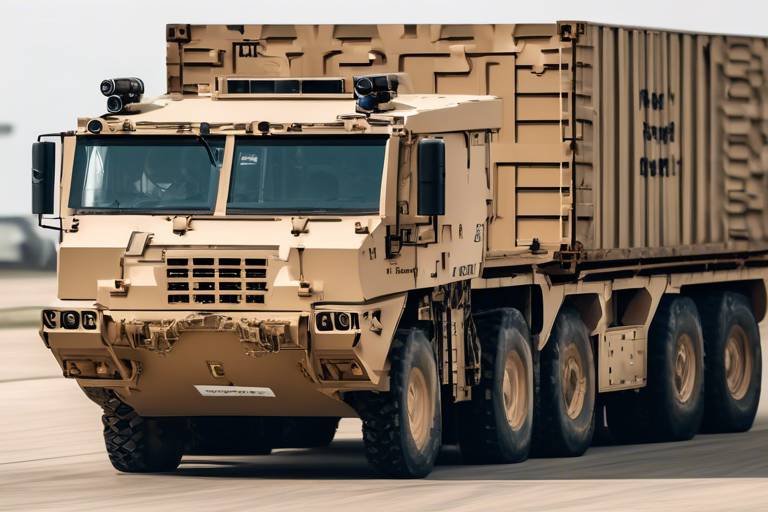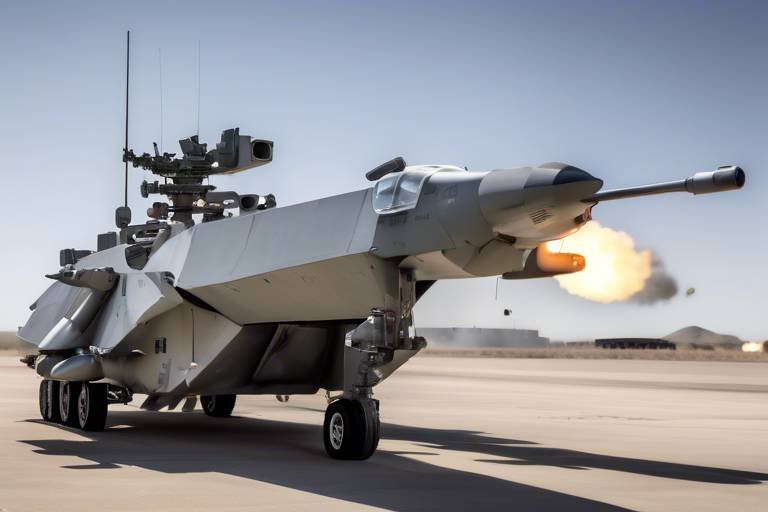How Blockchain is Being Used in Military Logistics
In today's rapidly evolving world, the intersection of technology and military operations has never been more critical. One of the most intriguing innovations making waves in this arena is blockchain technology. Imagine a digital ledger that is not only secure but also transparent and decentralized—this is the essence of blockchain. As military organizations grapple with the complexities of logistics, the application of blockchain is proving to be a game-changer, enhancing efficiency and security in defense supply chains. This article delves into how blockchain is revolutionizing military logistics, exploring its benefits, applications, challenges, and future potential.
At its core, blockchain technology is a decentralized system that records transactions across multiple computers, ensuring that the recorded information cannot be altered retroactively. This creates an environment of transparency and trust, which is essential in military logistics where every detail counts. Imagine a scenario where each supply chain transaction—from the procurement of materials to the delivery of equipment—is logged in a secure and immutable manner. This is precisely what blockchain enables. By ensuring that all stakeholders have access to the same data in real-time, blockchain helps mitigate risks associated with misinformation and fraud, which can be detrimental in military operations.
The adoption of blockchain in military logistics presents a plethora of advantages. Let's dive into some of the most significant benefits:
One of the standout features of blockchain is its ability to provide an immutable record of transactions. This means that once a transaction is recorded, it cannot be changed or deleted. For military logistics, this translates into improved transparency and traceability of supplies and equipment. Imagine being able to track every component of a military vehicle, from the initial procurement of parts to the final delivery. Enhanced transparency can significantly reduce instances of fraud and errors, which can be costly and dangerous in a military context.
In the military, timing is everything. The ability to share data in real-time across various stakeholders is crucial for effective logistics operations. Blockchain facilitates seamless communication and data exchange among military units and suppliers, ensuring that everyone is on the same page. This real-time capability allows for quicker decision-making, which can be the difference between success and failure in critical operations. With blockchain, logistics personnel can access up-to-date information on the status of supplies, enabling them to respond promptly to any issues that may arise.
Another significant advantage of blockchain is its inherent auditability. Every transaction recorded on the blockchain is time-stamped and linked to the previous one, creating a comprehensive trail of actions. This feature is particularly beneficial for military organizations as it aids in maintaining compliance with regulations and standards. With blockchain, audits become more straightforward, as all necessary data is readily available and verifiable. This not only streamlines the audit process but also enhances accountability within military logistics.
Despite the numerous benefits, the widespread adoption of blockchain in military logistics is not without its challenges. Several key obstacles need to be addressed:
- Technological Barriers: Integrating blockchain with existing systems can be complex and requires significant investment in technology.
- Regulatory Challenges: Navigating the regulatory landscape can be daunting, especially when dealing with sensitive military data.
- Cultural Resistance: Shifting mindsets and overcoming resistance to change within military organizations can hinder implementation efforts.
Several military organizations around the globe have begun to experiment with blockchain solutions, yielding promising results. For instance, the U.S. Department of Defense has engaged in pilot projects aimed at assessing blockchain's potential in supply chain management. These case studies not only showcase successful applications but also provide invaluable lessons for future implementations.
Collaborations with technology providers are essential for the successful implementation of blockchain in military logistics. By leveraging the expertise of tech companies, military organizations can overcome technical challenges and enhance their logistics capabilities. Such partnerships can lead to innovative solutions tailored to the unique needs of military operations, ensuring that blockchain technology is effectively utilized.
As blockchain technology continues to evolve, its applications in military logistics are set to expand further. Future trends may include the integration of artificial intelligence (AI) with blockchain to enhance predictive analytics in supply chain management. Additionally, the rise of smart contracts could automate various logistics processes, making them more efficient and less prone to human error. The potential for innovation is vast, and military organizations that embrace these trends will likely gain a significant advantage in logistics operations.
- What is blockchain technology? Blockchain is a decentralized digital ledger that records transactions across multiple computers, ensuring security and transparency.
- How can blockchain improve military logistics? Blockchain enhances transparency, traceability, real-time data sharing, and auditability in military logistics.
- What challenges exist in implementing blockchain? Key challenges include technological barriers, regulatory compliance, and cultural resistance within organizations.
- Are there real-world applications of blockchain in military logistics? Yes, several military organizations are piloting blockchain solutions to improve supply chain management.
- What does the future hold for blockchain in military logistics? Future trends may include AI integration and the use of smart contracts to automate logistics processes.

Understanding Blockchain Technology
Blockchain technology is a revolutionary concept that has taken the digital world by storm. At its core, it is a decentralized and secure method for recording transactions, which ensures that every piece of data is transparent and traceable. Imagine a digital ledger that isn't controlled by a single entity, but rather distributed across a network of computers. This means that once a transaction is recorded, it becomes nearly impossible to alter or delete, creating a system of trust that is essential for military logistics.
In military logistics, where the stakes are incredibly high and the need for accuracy is paramount, blockchain technology offers a way to streamline operations and enhance security. The fundamental principles of blockchain can be boiled down to three key components: decentralization, transparency, and immutability. These elements work together to create a robust framework for managing the complex supply chains that defense organizations rely on.
To further illustrate, let’s break down these principles:
- Decentralization: Unlike traditional systems that rely on a central authority, blockchain operates on a peer-to-peer network. This reduces the risk of a single point of failure and enhances resilience.
- Transparency: Every transaction is visible to all participants in the network, which fosters accountability and trust. In military logistics, this means that every supply chain movement can be tracked in real-time.
- Immutability: Once a transaction is recorded on the blockchain, it cannot be changed or tampered with. This feature is crucial for maintaining the integrity of sensitive military data.
The relevance of blockchain in military logistics cannot be overstated. With the increasing complexity of defense supply chains, where numerous stakeholders are involved, the need for a reliable system that can handle vast amounts of data securely is more critical than ever. By implementing blockchain, military organizations can not only enhance their operational efficiency but also ensure that they are compliant with various regulations and standards that govern defense logistics.
In summary, understanding blockchain technology is vital for grasping its potential impact on military logistics. As we delve deeper into its benefits, applications, and challenges, it becomes clear that blockchain is not just a technological trend; it is a transformative tool that can redefine how military supply chains operate. The journey to fully harnessing this technology may be fraught with challenges, but the rewards are well worth the effort.

Benefits of Blockchain in Military Logistics
The adoption of blockchain technology in military logistics is not just a passing trend; it's a game-changer that can redefine how defense supply chains operate. Imagine a world where every transaction, every shipment, and every piece of equipment is recorded in a secure, tamper-proof ledger. This is the reality that blockchain brings to the table, offering a multitude of benefits that can enhance efficiency and security in military operations.
One of the most significant advantages of blockchain is its ability to provide improved transparency. In military logistics, where the stakes are incredibly high, knowing exactly where supplies and equipment are at any given moment is crucial. Blockchain allows for real-time tracking of assets, ensuring that military units can monitor the status of their supplies from the moment they leave the supplier until they are delivered to the front lines. This level of visibility not only helps in planning and execution but also significantly reduces the risk of fraud and errors that can occur in traditional supply chains.
Moreover, blockchain enhances security in military logistics. With its decentralized nature, blockchain eliminates the risks associated with a single point of failure. Each transaction is encrypted and linked to the previous one, creating a chain that is incredibly difficult to alter. This means that any attempt to manipulate data would be immediately evident, thus safeguarding sensitive military information. The implications for operational security are profound, as military organizations can trust that their data is secure and reliable.
Another key benefit is the potential for streamlined operations. Traditional military logistics often involve multiple stakeholders, including suppliers, transporters, and military units, all of whom need to communicate and share data effectively. Blockchain facilitates this by allowing for seamless data sharing among all parties involved. For instance, if a supply shipment is delayed, all relevant parties can be notified in real-time, allowing them to adjust their plans accordingly. This level of coordination can significantly reduce delays and improve overall efficiency.
In addition to these operational benefits, blockchain also supports auditability and compliance. Military organizations must adhere to strict regulations and standards, and blockchain's inherent audit trail ensures that every transaction is recorded and verifiable. This feature not only simplifies compliance reporting but also instills a greater level of confidence among stakeholders. They can trust that the logistics processes are being conducted in accordance with established protocols.
In summary, the benefits of blockchain in military logistics are vast and varied. From enhanced transparency and security to streamlined operations and improved compliance, the technology holds the potential to revolutionize how military organizations manage their supply chains. As we move forward, embracing these advantages could be crucial for maintaining operational effectiveness in an increasingly complex global landscape.
- What is blockchain technology? Blockchain is a decentralized digital ledger that records transactions across many computers in a way that the registered transactions cannot be altered retroactively.
- How does blockchain improve transparency in military logistics? Blockchain provides real-time tracking of supplies and equipment, allowing stakeholders to see the status of assets at any time, which reduces fraud and errors.
- Is blockchain secure? Yes, blockchain is highly secure due to its decentralized nature and the encryption of each transaction, making it difficult for unauthorized changes to occur.
- What are the challenges of implementing blockchain in military logistics? Key challenges include technological barriers, regulatory compliance issues, and cultural resistance within military organizations.

Enhanced Transparency and Traceability
In the world of military logistics, where the stakes are incredibly high, transparency and traceability are not just buzzwords; they are essential components that can make or break operations. Imagine a scenario where every piece of equipment, every supply shipment, and every transaction is recorded on a digital ledger that cannot be altered. This is the promise of blockchain technology. By providing an immutable record of transactions, blockchain allows military organizations to track supplies and equipment in real-time, ensuring that everyone involved—from the supply chain managers to the frontline troops—has access to the same accurate information.
With blockchain, the traditional challenges of tracking military supplies, which often involve complicated paper trails and numerous intermediaries, can be streamlined. No longer will there be a guessing game about the location or status of critical supplies. Instead, every participant in the supply chain can view the same data, leading to improved coordination and efficiency. For instance, if a shipment of ammunition is delayed, the blockchain record can instantly inform all relevant parties, allowing them to adjust their plans accordingly. This level of transparency is crucial for reducing the risk of fraud and errors, which can have dire consequences in military operations.
Furthermore, the ability to trace the origin of supplies is a game-changer. With blockchain, military logistics can ensure that every item, from food rations to advanced weaponry, is sourced from verified suppliers. This not only enhances security but also builds trust among stakeholders. For example, if a particular batch of supplies is found to be defective, the blockchain can provide a clear audit trail, identifying where the supply chain went wrong and allowing for immediate corrective actions. This can prevent potential disasters and ensure that the troops receive only the best, most reliable equipment.
In summary, blockchain's role in enhancing transparency and traceability in military logistics is profound. By providing a secure, real-time, and immutable record of transactions, it allows for better decision-making, reduces the potential for fraud, and ultimately leads to more effective military operations. As we move forward, the integration of blockchain technology in military logistics will likely become a standard practice, paving the way for a new era of operational efficiency and security.
- What is blockchain technology? Blockchain is a decentralized digital ledger that records transactions across many computers in such a way that the registered transactions cannot be altered retroactively.
- How does blockchain enhance transparency in military logistics? By providing an immutable record of transactions that can be accessed by all stakeholders, blockchain ensures that everyone has the same accurate information, reducing the chances of fraud and errors.
- Can blockchain be used for real-time tracking of military supplies? Yes, blockchain enables real-time data sharing and tracking, allowing military organizations to monitor the status and location of supplies and equipment instantly.
- What are the benefits of traceability in military logistics? Traceability helps identify the origin of supplies, ensuring they are sourced from verified suppliers, which enhances security and builds trust among stakeholders.

Real-Time Data Sharing
In the fast-paced world of military logistics, is not just a luxury; it’s a necessity. Imagine a scenario where a military unit is operating in a remote location, and they need immediate access to supplies or equipment. Traditional methods of communication can be slow and prone to errors, leading to delays that could compromise operations. This is where blockchain technology steps in, revolutionizing how data is shared across various stakeholders.
With blockchain, data is not only shared in real-time but is also secure and tamper-proof. Each transaction is recorded in a distributed ledger that is accessible to authorized personnel, ensuring that everyone involved has the most up-to-date information. This level of transparency is crucial in military operations, where every second counts. For instance, if a supply truck is delayed due to unforeseen circumstances, the logistics team can instantly update the status on the blockchain, allowing commanders to adjust their plans accordingly.
Furthermore, the ability to share data in real-time helps to break down silos between different military units and suppliers. In traditional logistics, communication barriers can lead to misunderstandings and inefficiencies. However, with blockchain, all parties are on the same page, literally. Imagine a network where military units, suppliers, and even maintenance teams can access the same data simultaneously. This interconnectedness not only enhances operational efficiency but also fosters a culture of collaboration.
To illustrate the impact of real-time data sharing, consider the following benefits:
- Immediate Access to Information: Personnel can make informed decisions based on the latest data.
- Reduction of Errors: With everyone working from the same information, the chances of miscommunication decrease significantly.
- Enhanced Responsiveness: Quick adjustments can be made in response to changing conditions on the ground.
In conclusion, real-time data sharing enabled by blockchain technology is a game-changer for military logistics. It not only enhances operational efficiency but also ensures that military personnel have the information they need when they need it most. As the military continues to embrace this technology, the potential for improved logistics and supply chain management is immense.
- What is blockchain technology?
Blockchain is a decentralized digital ledger that records transactions across many computers securely and transparently. - How does real-time data sharing improve military logistics?
It allows military units to access up-to-date information, reducing errors and enhancing responsiveness during operations. - What are the challenges of implementing blockchain in military logistics?
Challenges include technological barriers, regulatory issues, and cultural resistance to change. - Can blockchain be used for other applications in the military?
Yes, blockchain has potential applications in areas such as procurement, inventory management, and personnel tracking.

Auditability and Compliance
In the realm of military logistics, auditability and compliance are not just buzzwords; they are essential pillars that ensure the integrity and effectiveness of supply chain operations. Blockchain technology inherently provides a robust framework for maintaining comprehensive records of all transactions. This means that every movement of supplies, from procurement to delivery, is documented in a way that is both secure and immutable. Imagine a ledger that cannot be altered or tampered with—this is the essence of blockchain. Each entry is time-stamped and linked to the previous one, creating a chain of information that is easy to follow and verify.
The auditability feature of blockchain allows military organizations to conduct thorough audits with minimal effort. Instead of sifting through mountains of paperwork or digital records that may have discrepancies, auditors can access a single, consistent source of truth. This not only saves time but also enhances the accuracy of audits, ensuring that any irregularities are quickly identified and addressed. For instance, if a shipment of medical supplies is delayed, the audit trail can pinpoint where the delay occurred, who was responsible, and what actions were taken, thereby improving accountability.
Moreover, compliance with military regulations and standards is paramount. Blockchain’s transparent nature means that all stakeholders can verify compliance in real-time. This can be particularly beneficial in scenarios where multiple agencies or contractors are involved in a supply chain. Each participant can access the same information, reducing the risk of misunderstandings or compliance violations. As a result, military organizations can confidently demonstrate adherence to regulations, which is crucial for maintaining operational integrity and securing funding or support.
To further illustrate the impact of auditability and compliance in military logistics, consider the following table that summarizes key benefits:
| Benefit | Description |
|---|---|
| Improved Accuracy | Blockchain eliminates discrepancies by providing a single source of truth for all transactions. |
| Enhanced Accountability | Every transaction is traceable, making it easier to identify responsible parties in case of issues. |
| Real-Time Compliance Verification | Stakeholders can verify adherence to regulations instantly, reducing the risk of violations. |
| Streamlined Audits | Auditors can access comprehensive records without the need for extensive manual checks. |
In conclusion, the auditability and compliance features of blockchain technology not only enhance the efficiency of military logistics operations but also provide a solid foundation for accountability and transparency. As military organizations continue to adopt blockchain solutions, they will likely find that these attributes lead to improved operational effectiveness, reduced risks, and greater trust among stakeholders.
- What is blockchain technology?
Blockchain is a decentralized digital ledger that records transactions across many computers, ensuring that the recorded information cannot be altered retroactively.
- How does blockchain improve military logistics?
It enhances transparency, security, and efficiency in supply chain management, allowing for real-time tracking and improved compliance.
- What are the challenges of implementing blockchain in military logistics?
Challenges include technological limitations, regulatory hurdles, and cultural resistance within organizations.
- Can blockchain help in audit processes?
Yes, it provides an immutable record of transactions that simplifies audits and enhances accountability.

Challenges in Implementing Blockchain
While the potential of blockchain technology in military logistics is indeed promising, the path to its widespread adoption is fraught with challenges. One of the primary hurdles is the technological barrier. Many military organizations currently rely on legacy systems that are not designed to integrate with blockchain. Transitioning from these established systems to a new, decentralized model can be daunting. It’s akin to trying to teach an old dog new tricks; the resistance to change is often rooted in the fear of the unknown and the complexities involved in overhauling existing processes.
Another significant challenge is the regulatory landscape. Military logistics operate under stringent regulations and compliance requirements, which can vary widely across different countries and regions. The decentralized nature of blockchain poses questions about data sovereignty and compliance with local laws. For instance, how does a military organization ensure that sensitive data remains compliant with national security regulations while utilizing an open and transparent system? This uncertainty can create hesitation among decision-makers.
Moreover, there is a cultural barrier that cannot be overlooked. The military is traditionally hierarchical, with established protocols and a clear chain of command. Introducing a technology that promotes decentralization can be perceived as a threat to established authority structures. This cultural resistance can slow down the adoption process, as personnel may be reluctant to embrace a system that challenges the status quo.
Finally, the cost of implementation cannot be ignored. Developing and deploying a blockchain solution requires significant investment in technology and training. Military budgets are often tightly controlled, and justifying the expenditure on new technology can be difficult, especially when the benefits are not immediately tangible. It's essential for military organizations to conduct thorough cost-benefit analyses to ensure that the long-term advantages of blockchain outweigh the initial investment.
In summary, while the integration of blockchain in military logistics holds substantial promise, the journey is not without its obstacles. Addressing these challenges requires a concerted effort from military leaders, technology providers, and regulatory bodies to create a framework that supports innovation while ensuring security and compliance.
- What are the main benefits of blockchain in military logistics?
Blockchain enhances transparency, security, and efficiency in supply chain management, reducing fraud and errors. - What are the technological challenges of implementing blockchain?
Many military organizations face difficulties integrating blockchain with legacy systems, which can hinder adoption. - How does blockchain impact compliance in military logistics?
Blockchain's decentralized nature raises questions about data sovereignty and adherence to various regulations. - Are there any successful case studies of blockchain in military logistics?
Yes, several military organizations are experimenting with blockchain solutions, showcasing promising results and lessons learned. - What future trends can we expect in blockchain technology for military logistics?
As technology evolves, we can anticipate more innovative applications that enhance operational efficiency and security.

Case Studies of Blockchain in Military Logistics
The implementation of blockchain technology in military logistics has been gaining traction, with several military organizations exploring its potential to revolutionize supply chain management. One of the most notable examples is the collaboration between the U.S. Department of Defense (DoD) and various tech companies to create a blockchain-based logistics system. This initiative aims to enhance the tracking and management of military assets, ensuring that supplies are delivered efficiently and securely. The pilot programs have demonstrated that blockchain can significantly reduce the time it takes to verify transactions and manage inventory, leading to improved operational readiness.
Another compelling case study comes from NATO, which has been investigating the use of blockchain for secure communications and logistics. By leveraging blockchain, NATO aims to create a decentralized system that allows member countries to share vital information without compromising security. This initiative not only enhances trust among allies but also streamlines the logistics process, ensuring that military units can access the supplies they need promptly. The results from initial tests have shown that blockchain can reduce the risk of data breaches and improve the accuracy of supply chain data.
In addition to these large-scale initiatives, smaller military units have also begun experimenting with blockchain technology. For instance, the Israeli Defense Forces (IDF) have implemented a blockchain pilot project to manage the distribution of critical supplies in real time. This project has allowed the IDF to track the movement of supplies from warehouses to the front lines, ensuring that troops receive the necessary equipment without delays. The success of this pilot has encouraged the IDF to explore further applications of blockchain in their logistics operations.
To better understand the impact of these case studies, let's take a look at some key outcomes:
| Organization | Project Focus | Key Outcomes |
|---|---|---|
| U.S. Department of Defense | Asset Tracking | Reduced verification time; improved inventory management |
| NATO | Secure Communication | Enhanced trust; streamlined logistics |
| Israeli Defense Forces | Supply Distribution | Real-time tracking; reduced delays in supply delivery |
These case studies illustrate the transformative potential of blockchain in military logistics. By fostering partnerships with technology providers, military organizations can overcome technical challenges and enhance their logistics capabilities. The collaboration between military forces and tech companies not only speeds up the adoption of innovative solutions but also ensures that the unique needs of defense supply chains are met. As these organizations continue to explore blockchain, they are paving the way for a more efficient and secure military logistics landscape.
- What is blockchain technology? Blockchain is a decentralized digital ledger that records transactions across many computers, ensuring that the recorded information cannot be altered retroactively.
- How does blockchain improve military logistics? By providing enhanced transparency, real-time data sharing, and auditability, blockchain helps streamline operations and reduce errors in military logistics.
- What are some challenges in implementing blockchain? Key challenges include technological barriers, regulatory compliance, and cultural resistance within military organizations.
- Are there any successful case studies of blockchain in military logistics? Yes, organizations like the U.S. Department of Defense and NATO have successfully implemented blockchain solutions to improve asset tracking and secure communications.

Partnerships with Technology Providers
In the rapidly evolving landscape of military logistics, collaborations with technology providers have become essential for harnessing the full potential of blockchain technology. These partnerships are not just a trend; they represent a strategic move towards enhancing operational efficiency and security. Imagine a well-oiled machine where every cog works seamlessly with the others—that's the vision military organizations can achieve by joining forces with tech companies. By pooling resources and expertise, both parties can navigate the complex challenges that come with implementing blockchain solutions.
One of the most significant advantages of partnering with technology providers is the access to cutting-edge innovations. Many military organizations may lack the in-house expertise to develop robust blockchain systems from scratch. However, by collaborating with established tech firms, they can leverage existing technologies and frameworks that have been tested and proven in various sectors. This not only accelerates the implementation process but also minimizes the risks associated with new technology adoption. For instance, companies specializing in supply chain management software can offer tailored solutions that integrate blockchain capabilities, ensuring that military logistics operations become more streamlined and effective.
Moreover, these partnerships can facilitate knowledge transfer. Technology providers often have a wealth of experience in implementing blockchain in different industries, and their insights can be invaluable for military organizations. They can offer training sessions, workshops, and ongoing support, helping military personnel understand the intricacies of blockchain technology and how to utilize it effectively in logistics. This knowledge transfer is crucial for ensuring that the staff is well-equipped to handle the new systems, thus reducing the likelihood of errors and inefficiencies.
However, it’s important to approach these partnerships with a clear strategy. Military organizations should carefully evaluate potential technology providers based on their track record, expertise in blockchain, and ability to meet specific military needs. A thorough assessment can prevent costly mistakes and ensure that the chosen partner aligns with the organization’s long-term objectives. Establishing clear communication channels and setting mutual goals are also key factors that can lead to successful collaborations.
As the military sector continues to embrace digital transformation, the need for effective partnerships will only grow. The future of military logistics is not just about adopting new technologies but doing so in a way that enhances operational capabilities and maintains security. By fostering strong relationships with technology providers, military organizations can position themselves at the forefront of innovation, ensuring that they are always prepared to meet the challenges of modern warfare.
- What are the main benefits of partnering with technology providers for blockchain implementation?
Partnerships provide access to expertise, innovative solutions, and training, which can significantly enhance the efficiency and security of military logistics. - How can military organizations assess potential technology partners?
Organizations should evaluate a partner's experience, track record, and ability to meet the specific needs of military logistics, ensuring alignment with long-term goals. - What role does knowledge transfer play in these partnerships?
Knowledge transfer ensures that military personnel understand blockchain technology and its applications, reducing errors and enhancing operational efficiency.

Future Trends and Innovations
This article explores the transformative role of blockchain technology in military logistics, focusing on its benefits, applications, challenges, and future potential in enhancing efficiency and security within defense supply chains.
Blockchain technology offers a decentralized and secure way to record transactions, ensuring transparency and traceability. This section will explain the fundamental principles of blockchain and its relevance to military logistics.
The adoption of blockchain in military logistics presents numerous advantages, including improved transparency, enhanced security, and streamlined operations. This section delves into how these benefits can optimize supply chain management in defense.
Blockchain provides an immutable record of transactions, facilitating real-time tracking of supplies and equipment. This subsection discusses how enhanced transparency can reduce fraud and errors in military logistics operations.
The ability to share data in real-time across various stakeholders is crucial in military logistics. This part examines how blockchain enables seamless communication and data exchange among military units and suppliers.
Blockchain's inherent auditability ensures that all transactions are recorded and verifiable. This section focuses on how this feature aids military organizations in maintaining compliance with regulations and standards.
Despite its potential, several challenges hinder the widespread adoption of blockchain in military logistics. This section outlines the key obstacles, including technological, regulatory, and cultural barriers.
Several military organizations have begun implementing blockchain solutions. This section highlights notable case studies, showcasing successful applications and the lessons learned from these initiatives.
Collaborations with tech companies are essential for successful blockchain implementation. This subsection discusses how military organizations can leverage partnerships to overcome technical challenges and enhance their logistics capabilities.
As we look to the horizon, the future of blockchain in military logistics is not just promising—it's downright exciting! Imagine a world where every piece of equipment, from drones to ammunition, is tracked with pinpoint accuracy. This is not merely a dream; it's becoming a reality thanks to ongoing innovations in blockchain technology.
One of the most significant trends we anticipate is the integration of Artificial Intelligence (AI) with blockchain. By combining these two powerful technologies, military logistics can achieve unprecedented efficiency. For instance, AI algorithms can analyze vast amounts of data stored on the blockchain to predict supply chain disruptions before they occur, allowing for proactive measures to be taken. This synergy could revolutionize how the military manages its logistics, making operations smoother and more resilient.
Another exciting trend is the development of smart contracts. These are self-executing contracts with the terms of the agreement directly written into code. In military logistics, smart contracts could automate procurement processes, ensuring that supplies are delivered exactly when and where they're needed, significantly reducing delays and errors. Imagine a scenario where a military unit can automatically reorder supplies as they are consumed, all without human intervention!
Moreover, the rise of Internet of Things (IoT) devices is set to enhance blockchain's capabilities even further. By integrating IoT with blockchain, every item in the supply chain can be equipped with sensors that provide real-time data on its condition and location. This means that military logistics can achieve a level of transparency and traceability that was previously unattainable. The ability to monitor the status of supplies in real-time can help prevent shortages and ensure that troops have what they need, when they need it.
However, with all these advancements, it's essential to consider the ethical implications of using blockchain technology in military logistics. As we harness the power of data, we must also ensure that it is protected and used responsibly. This includes addressing concerns about privacy and data security, especially when dealing with sensitive military information.
In summary, the future of blockchain in military logistics is poised for remarkable growth, driven by innovations like AI, smart contracts, and IoT integration. As these technologies evolve, they promise to enhance operational efficiency, security, and transparency, ultimately leading to a more effective military supply chain.
- What is blockchain technology?
Blockchain is a decentralized digital ledger that records transactions across many computers securely and transparently.
- How does blockchain improve military logistics?
It enhances transparency, security, and efficiency in supply chain management, allowing for real-time tracking and data sharing.
- What are smart contracts?
Smart contracts are self-executing contracts with the agreement terms directly written into code, automating processes and reducing delays.
- What challenges does blockchain face in military logistics?
Challenges include technological, regulatory, and cultural barriers that may hinder widespread adoption.
Frequently Asked Questions
- What is blockchain technology?
Blockchain technology is a decentralized digital ledger that records transactions across multiple computers. This ensures that the recorded transactions cannot be altered retroactively, providing a high level of security and transparency.
- How does blockchain enhance military logistics?
Blockchain enhances military logistics by improving transparency, enabling real-time data sharing, and providing an immutable record of transactions. This helps in tracking supplies and equipment more efficiently, reducing fraud and errors.
- What are the main benefits of using blockchain in defense supply chains?
The main benefits include enhanced transparency, improved security, streamlined operations, and better compliance with regulations. These advantages lead to more efficient supply chain management in military operations.
- What challenges are faced in implementing blockchain in military logistics?
Challenges include technological barriers, regulatory hurdles, and cultural resistance within military organizations. Overcoming these obstacles is crucial for the successful adoption of blockchain solutions.
- Can you provide examples of military organizations using blockchain?
Yes! Several military organizations have started implementing blockchain solutions. Notable case studies include partnerships with technology providers to enhance logistics capabilities and improve operational efficiency.
- What future trends can we expect in blockchain technology for military logistics?
Future trends may include advancements in smart contracts, increased interoperability between systems, and broader adoption of blockchain for supply chain optimization, leading to even greater efficiencies in military logistics.



















